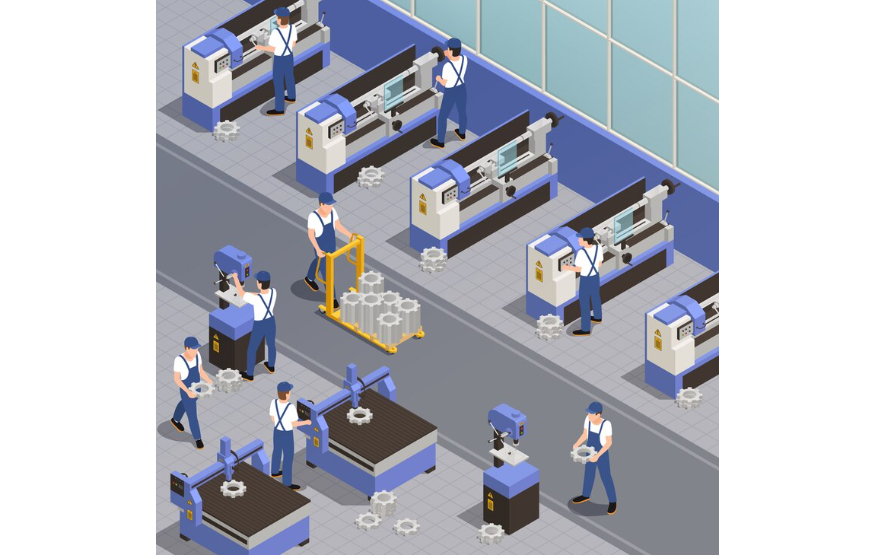Are CNC Machines the Future of Granite Fabrication?

With its timeless elegance and durability, granite has been a staple in architectural and interior design for centuries. From kitchen countertops to monumental sculptures, granite has proven itself as a material of choice due to its natural beauty and resilience. However, the process of shaping and crafting granite into functional or decorative pieces has traditionally been labor-intensive and time-consuming. Enter CNC (Computer Numerical Control) machines, revolutionizing how granite is fabricated. In this blog, we delve into the realm of CNC machines for granite fabrication and explore whether they truly represent the future of this industry.
Understanding CNC Machines for Granite Fabrication
CNC machines are automated tools that utilize computer-aided design (CAD) and computer-aided manufacturing (CAM) software to precisely control and manipulate tools for cutting, carving, and shaping various materials, including granite. These machines follow instructions programmed into their software to execute intricate designs with unparalleled accuracy and efficiency.
In the realm of granite fabrication, CNC machines have significantly streamlined the production process. Traditional methods often involved manual labor, where skilled craftsmen would use handheld tools to cut and shape granite slabs according to specific designs. While craftsmanship remains a valuable aspect of granite fabrication, CNC machines have augmented these skills by offering precision and consistency that are difficult to achieve manually.
The Advantages of CNC Machines for Granite Fabrication
1. Precision: CNC machines excel in precision cutting and carving, ensuring intricate designs are executed flawlessly. Whether it’s intricate patterns or complex shapes, CNC machines can reproduce designs with remarkable accuracy, minimizing material waste and maximizing efficiency.
2. Efficiency: By automating the fabrication process, CNC machines significantly reduce production time compared to traditional methods. Tasks that would take hours or even days to complete manually can be accomplished swiftly and consistently with CNC technology, leading to faster project turnaround times.
3. Customization: One of the most significant advantages of CNC machines is their ability to easily handle custom designs. Whether it’s a unique countertop shape or a bespoke sculpture, CNC technology allows fabricators to bring their client’s visions to life with precision and efficiency.
4. Complexity: CNC machines can tackle complex designs that would be challenging or impossible to achieve manually. From intricate engravings to three-dimensional sculptures, CNC technology opens up a world of creative possibilities for granite fabrication.
5. Consistency: Consistency is key with CNC machines. Each piece produced replicates the design programmed into the machine, ensuring uniformity across multiple components or projects.
Overcoming Challenges and Limitations
While CNC machines offer numerous advantages for granite fabrication, they are not without challenges and limitations. Some of these include:
1. Initial Investment: Acquiring and setting up CNC machines can represent a significant initial investment for fabricators. However, many see it as a worthwhile investment considering the long-term benefits in terms of efficiency and quality.
2. Maintenance and Training: Proper maintenance and regular calibration are essential to ensure CNC machines operate at peak performance. Additionally, fabricators need skilled operators trained in CAD/CAM software to program and operate these machines effectively.
3. Material Constraints: While CNC machines can handle various materials, including granite, there are limitations regarding the size and thickness of the material that can be processed. Large slabs or exceptionally thick granite may require specialized equipment or manual intervention.
4. Design Limitations: While CNC machines offer incredible flexibility in executing designs, certain design elements may still pose challenges. For example, sharp internal corners or intricate details may require additional tooling or post-processing to achieve the desired result.
The Future of Granite Fabrication: Embracing CNC Technology
Despite these challenges, CNC machines have revolutionized the granite fabrication industry. As technology advances, we can expect further enhancements and innovations in CNC technology, making granite fabrication even more efficient, precise, and accessible.
Integrating artificial intelligence (AI) and machine learning algorithms could further optimize CNC processes, improving efficiency and reducing waste. Additionally, advancements in robotics may lead to the development of fully automated fabrication systems capable of handling the entire production process from slab cutting to final polishing.
Furthermore, the environmental benefits of CNC technology should not be overlooked. By minimizing material waste and optimizing resource utilization, CNC machines contribute to a more sustainable approach to granite fabrication, aligning with the growing demand for eco-friendly solutions in the construction and design industries.
Conclusion
In conclusion, CNC machines represent a transformative force in the world of granite fabrication. By combining precision, efficiency, and customization capabilities, CNC technology has redefined what’s possible in terms of design and production. While challenges remain, the ongoing advancements in CNC technology promise to further elevate the granite fabrication industry, making it more accessible, efficient, and sustainable than ever before.
As fabricators and designers continue to embrace CNC technology, we can expect to see even more breathtaking creations made from this timeless and versatile material. Whether it’s a sleek kitchen countertop or an intricate architectural masterpiece, CNC machines are shaping the future of granite fabrication, one precise cut at a time.




